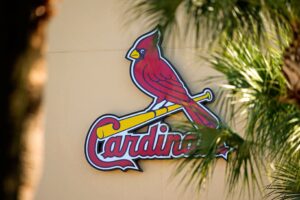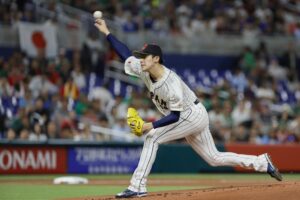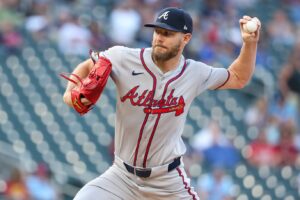Due to the COVID-19 pandemic, this year’s MLB Draft was quite unusual. Some of the biggest changes included the draft being held virtually and the number of rounds being cut from 40 to five. Also, with the college and high school baseball seasons canceled, teams were unable to monitor prospects in the weeks leading up to the draft. As a result, teams had to rely on a reduced amount of information when evaluating players.
As for the Atlanta Braves, they made just four picks in this year’s shortened draft. In the past, Atlanta has had plenty of success drafting and developing prospects into big-league stars. They came into this year’s draft looking to add more skilled players into their already deep and talented farm system.
So, without further ado, let’s take look at how the 2020 Draft went for the Atlanta Braves.
Atlanta Braves 2020 MLB Draft Recap
Round One, Pick 25: Jared Shuster
The Braves are very fond of drafting and stocking up their farm system with pitching prospects, and this year wasn’t any different. With the 25th overall pick, Atlanta selected left-handed pitcher Jared Shuster. Shuster, out of Wake Forest University, struggled early on in his college career but turned things around at the Cape Cod League last summer. He continued this success in the abbreviated 2020 college season, posting a 2-1 record, 3.76 ERA, and 0.949 WHIP. This turnaround was credited to his improved mechanics and added strength. The 6’3″, 210-pound starting pitcher features an above-average fastball, changeup, and an improving slider.
Because Shuster was ranked as the 77th best prospect on MLB.com, some fans were confused as to why the Braves drafted him so early. However, there’s a lot of upside with this pick. If Shuster can consistently throw strikes and keep the ball down in the zone, he has a chance to be a middle of the rotation starter at the next level.
Grade: B
Round Three, Pick 97: Jesse Franklin
72 slots later, the Braves were finally back on the clock. This time around they decided to draft outfielder Jesse Franklin. Franklin, out of the University of Michigan, was originally drafted by the Seattle Mariners in 2017 but chose to honor his commitment to Michigan. In 115 collegiate games, he batted .287, hit 23 home runs, and drove in 102 runs. He also demonstrated a good eye at the plate, drawing 65 walks and striking out only 88 times in 512 plate appearances. The 6’1″, 215-pound outfielder has good speed but seldom utilizes it on the basepaths. In the field, he uses his speed and athleticism to make difficult plays look easy. However, his below-average arm strength will probably keep him in left field.
Jesse Franklin impresses in every aspect of the game.
The @Braves got a great one.#GoBlue #BlueCrew #ProBlue pic.twitter.com/i2L3eOySlD
— Michigan Baseball (@umichbaseball) June 12, 2020
Although the Braves farm has an array of depth at the outfield position, they decided to take the power-hitting outfielder. Franklin has a lot of potential but will have to battle his way through an already crowded outfield system.
Grade: C+
Round Four, Pick 126: Spencer Strider
Atlanta’s third pick was starting pitcher Spencer Strider. Strider opened many eyes at Clemson University when he was named a Freshman All-American in the 2018 season. Unfortunately, he missed the entire 2019 season after having Tommy John surgery and made just four starts in 2020. In his career at Clemson, he recorded a 5-2 record, 4.71 ERA, and struck out 89 batters in 63 innings. Strider is a bit undersized on the mound — listed at 6’0″, 190-pounds. However, he still manages to throw a mid-90’s fastball, and he also features an improving changeup and curveball.
Considering that the Braves had just four picks in the draft, selecting an undersized pitcher with injury concerns doesn’t make a lot of sense. If Strider was set on leaving Clemson the Braves could have tried to sign him as an undrafted free agent for $20,000. Nevertheless, Atlanta will hope that Strider can stay healthy and develop into a reliable big-league pitcher.
Grade: C-
Round Five, Pick 156: Bryce Elder
With their final selection in the draft, the Braves picked starting pitcher Bryce Elder. Elder played his college ball at Texas University, where he posted a 10-6 record, 3.42 ERA, and a batting average against of .241. In his truncated junior season, he was named to the Collegiate Baseball Newspaper All-American second team after ending the season with a 2-1 record, 2.09 ERA, and a .191 batting average against. The 6’2″, 220-pound pitcher showcases four solid offerings — sinker, slider, curveball, and changeup. All of his pitches have great spin and he does a good job throwing them for strikes. He doesn’t possess elite velocity, but he mixes his pitches well and puts hitters away with a devastating slider.
“?? ?’? ??? @Braves, ? ???’? ??????? ?? ???? ????.” – @jimcallisMLB @bryce_elder13 just brings it. #HookEm | #MLBDraft ? Atlanta Braves MLB Draft Atlanta Braves MLB Draft pic.twitter.com/O1hTzHIGT1
— Texas Baseball (@TexasBaseball) June 12, 2020
If the Braves can sign Elder this might be the steal of the draft. Any time you can snag a player with high upside this late in the draft, it’s a win. Now we’ll wait and see if the Braves can ink him to a contract.
Grade: A
Conclusion
It’s very unusual to see an MLB team select all college players in the draft, but that’s what the Braves did. Although there might’ve been players with higher upsides in the first three rounds, you can’t criticize the Braves for playing it safe by selecting experienced college players. As a result, the Braves added more depth to their proficient farm system.
Final Grade: B-
Main Photo:
Embed from Getty Images






